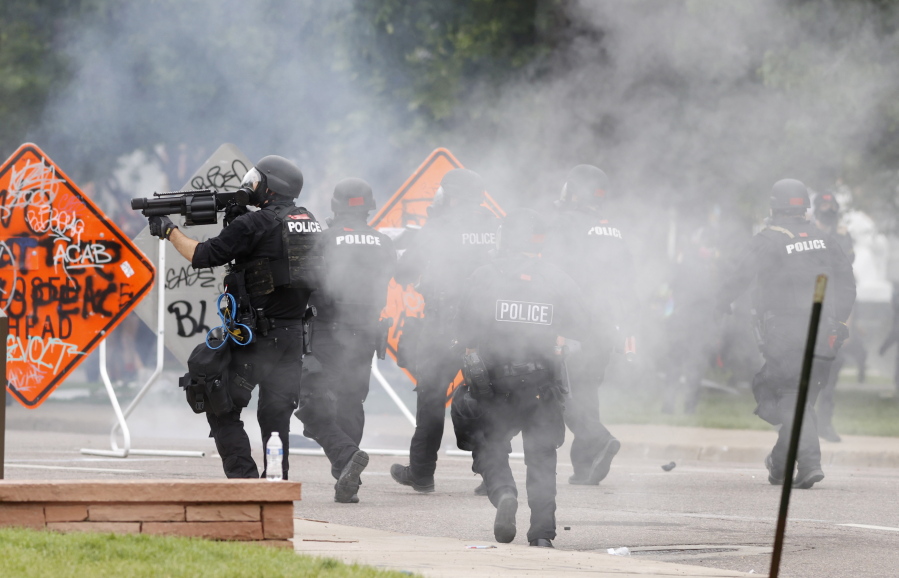DENVER (AP) — Jurors began deliberating Friday in a federal lawsuit accusing police of using indiscriminate force against people protesting in Denver the police killing of George Floyd two years ago, violating their constitutional rights.
The federal civil rights case, brought by 12 protesters who were hit by everything from pepper spray to a Kevlar-bag filled with lead shot fired from a shotgun, is believed to be the first challenging police tactics during the 2020 protests that erupted around the nation to go to trial.
The protesters say the force violated their rights to demonstrate and be protected from unreasonable force and that the city of Denver should be held liable, paying damages of around $1 million each for most of them but $4.5 million for a man who ended up in intensive care after being hit in the head with the shotgun bag.
One of their lawyers, Timothy Macdonald, told jurors in closing arguments that the protesters were not in court for the money but to hold the city’s police department accountable. The protesters claim that Denver is responsible for the alleged excessive force through its policies, including giving officers wide discretion in using what police call “less lethal” devices, failing to train officers on them and not requiring them to use their body worn cameras during the protests to deter indiscriminate uses of force.
“You have the ability to send a message to the Denver Police Department and police departments everywhere,” he said.
Denver admits that mistakes were made during the protests, which it says were unprecedented in their size, duration and amount of violence and destruction. Over 80 officers were injured as protesters hurled rocks, water bottles and canned food at officers, and the state Capitol, the hub of the protests, $1.1 million in damage, according to the city.
One of Denver’s lawyers, Lindsay Jordan, told jurors that the city had planned a large training in crowd control in the spring of 2020 because of the upcoming presidential election but it was canceled because of COVID-19. She stressed that mistakes made by officers during the protests do not automatically equate to constitutional violations, noting that thousands of people returned to exercise their free speech rights despite the force police used over the five days of demonstrations.
While lawyers for the protesters showed videos and photos of other demonstrators being hit with pepper spray and sprayed with pepper balls while filming the police, flipping off or sounding off against officers or apparently walking down the street, Jordan told jurors they had to focus only on what happened to the 12 plaintiffs. She also urged them to focus on what was happening in the rest of the crowd when force was used against the plaintiffs, following testimony from police that some people may have been inadvertently hit because of actions by agitators nearby.
“The violence and destruction that occurred around the community required intervention,” she said.
Aggressive responses from police to people protesting police brutality nationally have led to financial settlements, the departures of police chiefs and criminal charges.
In Austin, Texas, officials have agreed to pay over $13 million to people injured in protests in May 2020, and 19 officers have been indicted for their actions against protesters. Last month, two police officers in Dallas accused of injuring protesters after firing less lethal munitions were charged.
However, in 2021, a federal judge dismissed most of the claims filed by activists and civil liberties groups over the forcible removal of protesters by police before then-President Donald Trump walked to a church near the White House for a photo op.




